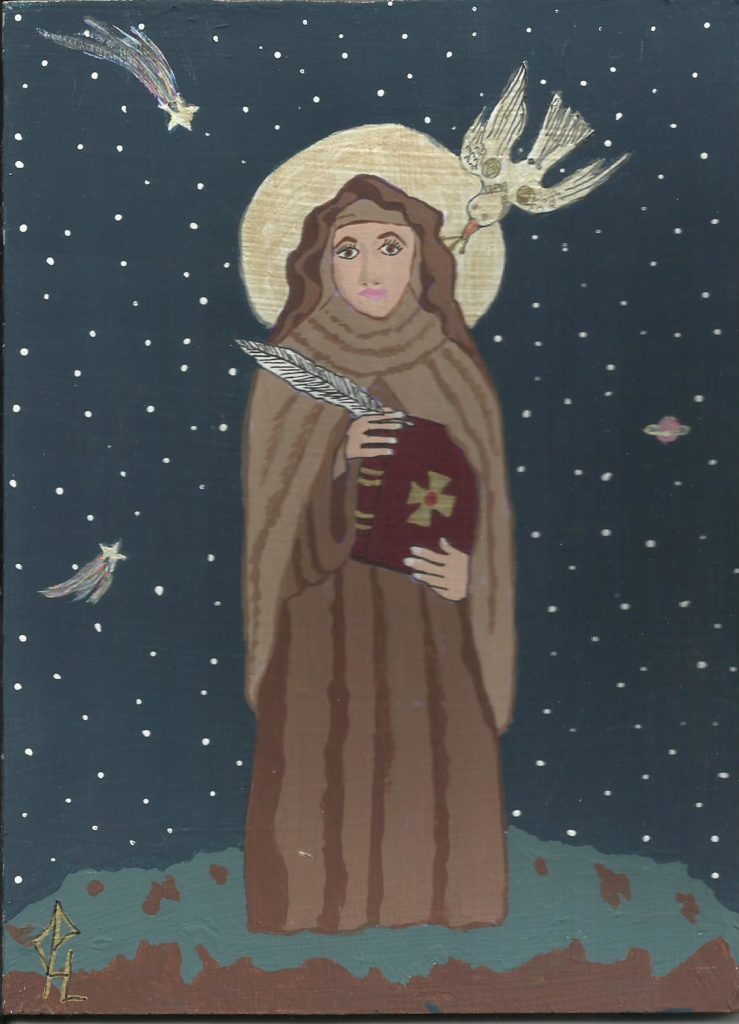 An image of St Teresa from an interesting contemporary artist in New Mexico Patricia Hostetter-Lopez
An image of St Teresa from an interesting contemporary artist in New Mexico Patricia Hostetter-Lopez
She (Teresa of Avila) makes clear in what sense she uses the word prayer. “I could not,” she writes, “shut myself up within myself, in which consisted my whole way of prayer.” To pray (she stresses this repeatedly) is to withdraw into oneself, like the tortoise or the hedgehog. It is to find God hidden in the innermost part of the soul, like the succulent kernel concealed among the layers in the middle of the plamito or dwarf palm. She develops this idea in the ‘Interior Castle’ in which she writes of God as a King whose council chamber is in the center of the palace. This conception of prayer first came to her when she read the ‘Third Spiritual Alphabet’ of Francisco de Osuna which was given her by her uncle Don Pedro de Cepeda when she visited him on her way to Becedas to be treated by the curandera. Her copy of this book may be seen in the sacristy of Saint Joseph’s convent, Avila, along with a drum and pipes that she used to play at recreation—also one of her letters that has been decorated with bright, painted birds. It is a small volume, much scored, with yellowed leaves and heavy type. In the margins, to draw attention to passages of importance, there are signs that include a heart, a cross, and a pointing hand. I had reason to remember this book when, as I was traveling one day to Granada to Seville, the bus drew up in a street of dazzlingly white houses. It was Osuna, where the author of the ‘Third Spiritual Alphabet’ was born. White walls and iron balconies came up to the windows of the bus. Ahead I saw more white walls and golden pantile roofs and overhead the glaring blue of the sky. Francisco de Osuna, who like Ignatius Loyola was a soldier as well as a mystic, was at Tripoli when the Spaniards took the town in 1510. He writes of prayer in the language of human love which he describes as “a ladder which the feet of the wise mount to God.” Prayer is nothing else than a conversation, as Teresa was later to put it, between two persons who love each other. Moreover to love God is within the scope of all for it is dependent not on activity but on the will. “All,” he writes, “cannot fast or wear rough clothing, labor or journey. But if you say you cannot love, I do not believe you.” –‘A Journey in Spain: Saint Teresa’ by Elizabeth Hamilton
Nada te espante,
Todo se pasa,
Dios no se muda.
La paciencia
Todo lo alcanza;
Quien a Dios tiene
Nada le falta:
Sólo Dios basta.
Eleva el pensamiento,
Al cielo sube,
Por nada te acongojes,
Nada te turbe.
A Jesucristo sigue
Con pecho grande,
Y, venga lo que venga,
Nada te espante.
¿Ves la gloria del mundo
Es gloria vana;
Nada tiene de estable,
Todo se pasa.
Aspira a lo celeste,
Que siempre dura;
Fiel y rico en promesas,
Dios no se muda.
Ámala cual merece
Bondad inmensa;
Pero no hay amor fino
Sin la paciencia.
Confianza y fe viva
Mantenga el alma,
Que quien cree y espera
Todo lo alcanza.
Del infierno acosado
Aunque se viere,
Burlará sus furors
Quien a Dios tiene.
Vénganle desamparos,
Cruces, desgracias;
Siendo Dios su tesoro,
Nada le falta.
Id, pues, bienes del mundo;
Id, dichas vanas;
Aunque todo lo pierda,
Sólo Dios basta.
Nothing scares you,
Everything passes,
God does not move.
Patience
All achieve it;
Whoever has nothing;
Only God is sufficient.
Lift up the thought,
To the sky rises,
Do not worry about nothing,
Nothing troubles you.
Jesus Christ remains,
With a Sacred Heart,
And come what may,
Do not be afraid.
Do you see the glory of the world?
It is vain glory;
Nothing is stable,
Everything passes
He aspires to the celestial,
Permanence, ever-lasting;
Faithful and rich in promises,
God is unchanging.
Love that which deserves love,
Immense Goodness;
But there is no refined love,
Without patience.
Trials and tribulations,
Trust and live in faith,
Keep the soul,
That who believes and hopes,
Everything is achieved.
Within the harassed hell,
Through, he sees himself,
He will mock his wrath
Whoever has God.
Approach Him helpless,
Crosses and misfortunes;
God is the treasure,
Nothing lacking.
Go therefore, worldly goods;
The vain;
Even if I lose everything,
God alone is sufficient.

